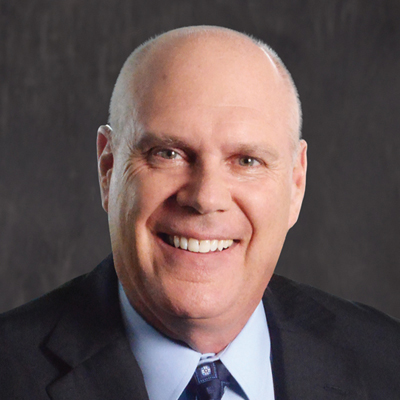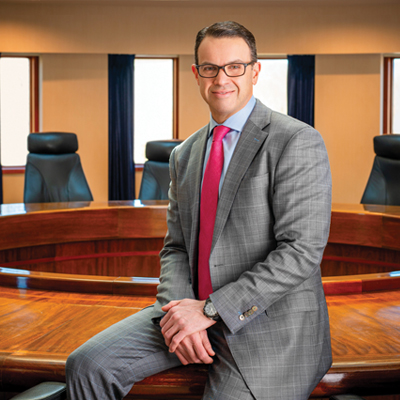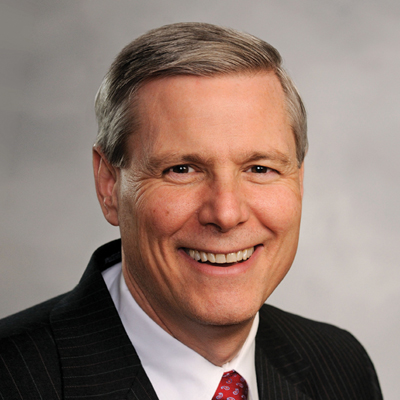CEO Interviews
Remote Access
Insurance CEOs are adjusting to leading a remote workforce. Along the way, they’re learning about themselves, their people and what changes they want to continue when the global pandemic ends. Special Section sponsored by LexisNexis.
The Leaders Special Section is sponsored by LexisNexis. Click on the microphone icon to listen to the LexisNexis podcast.
Jack Salzwedel parked his car in a deserted three-story parking garage at American Family's campus in Madison, Wisconsin. He walked alone through his building's empty atrium and down its quiet corridors to his office.
Roughly 98% of American Family's employees are working from home as a result of the COVID-19 outbreak. Salzwedel is among them, though he occasionally returns to headquarters when he needs optimal connectivity for virtual meetings.
“It's really weird not being able to talk with people in person. I miss that,” Salzwedel, the chairman and CEO of American Family, said.
Salzwedel and his fellow insurance CEOs are accustomed to leading through crises—be they natural catastrophes, the Sept. 11 terror attacks or the financial crisis of 2008-09. But the global pandemic upended both their workforces and workplaces, scattering their employees and creating a fully remote environment.
For industry CEOs, several of whom are featured in the following pages, the pandemic has been an eye-opener. It has reminded them of their fundamental roles as leaders—to support their people—and taught them new methods of doing so. In many ways, they said, their companies are stronger for it.
“We've made the comment that it took COVID and physical distancing to bring us closer as an organization,” Salzwedel said. “And I think there's a lot of truth in that.”

We’ve made the comment that it took COVID and physical distancing to bring us closer as an organization. And I think there’s a lot of truth in that.
Jack Salzwedel
American Family
Salzwedel and his management team have implemented weekly, all-enterprise huddles via Webex and Zoom. These discussions give employees greater access than ever to senior leaders.
“There are questions about what our executives are doing as they're sheltering in place. What are the issues they're dealing with in their personal lives?” Salzwedel said. “It allows our leaders to put a more human face on themselves as they talk to employees about the everyday struggles that they have in their lives as they're dealing with this digital connection.”
The pandemic has taught Salzwedel something about his employees, too: Don't underestimate their adaptability. “This has definitely taught me another lesson in the ability of the workforce to flex and bend to new things,” he said. “If we've got ideas, if we know where we need to go, going there quickly allows people to flex and bend and show what they can do.”
The transition to a remote environment proved that.
“Moving from 25% remote to 98% remote, it was difficult. It was a challenge, but I would say I would have thought it would have been much more difficult,” Salzwedel said. “If you think about pandemics or recessions, you can think about them as accelerants. For us to get to 98% away from the office, it would have taken us probably five years to make all that happen. It happened within a two-week period.”
Step Away
Matt Mosher learned a valuable lesson early in the pandemic: Step away from the computer.
“I got locked into that for a while. You have breakfast, sit down at your computer and you're at the computer all day long,” Mosher, the president and CEO of AM Best Rating Services, said. “You have to make sure people don't burn out. You have to make sure to set boundaries as a person.”
That's a message Mosher has been pushing since shortly after his organization went remote in March. This crisis, he said, has given him a greater appreciation for the emotional intelligence aspect of leadership.

You need to count on your people and let them go. They will get the job done.
Matt Mosher
AM Best Rating Services
“I've had to understand people better,” he said. “Leading during this crisis is really about dealing with the emotions of people and understanding that the emotions matter. People are dealing with things that are much different than they're used to. Some people have children at home and are trying to get them through their school day while also trying to do work.
“You need to let people know you understand their issues and it's OK if they need to step away for a bit or work different hours.”
Operationally, the transition to a work-from-home environment has been smooth, Mosher said. The challenge has been keeping employees connected.
“As we got to weeks four and five, and it started to set in that this is going to be a long haul, it really started to wear on people,” Mosher said. “One of my biggest challenges has been keeping people connected.”
He started a weekly trivia contest, teams vs. teams, to help on that front and has encouraged his staff to communicate via video rather than phone.
“I'll tell our people, 'Go have coffee together over a Skype call,'” he said. “One of the great things about technology is that you can hit the camera and have a video call. The face-to-face interaction really does help you feel a little bit of a connection.”
Mosher said the transition to remote work has been much better than he expected.
“The amount of work people are doing and the effort they're putting in really shows you their commitment,” he said. “They really want to help the company to succeed. You just need to give them the opportunity. This has given them the opportunity. It's a challenge. It's a crisis. We need everybody to pick up. And you know what? Everybody did pick up and they've worked even harder.” Seeing that reaffirmed another leadership lesson for Mosher.
“You need to count on your people and let them go,” he said. “They will get the job done.”
Trial by Fire
John Marchioni had barely settled into the CEO's office before he had to swap it for a home office. One month into his tenure as CEO of Selective Insurance, the state of New Jersey, where Selective is headquartered, issued a stay-at-home order.
“This is not what we had planned for my first quarter in the job,” said Marchioni, who was president of Selective before becoming CEO in February. “I felt like I was so prepared. I had worked very closely alongside our recently retired CEO, Greg Murphy. I felt like we had laid out a strategy and were well on the path to executing. This was going to be more about me imprinting on the culture in terms of how I lead.”
Instead, Marchioni was thrown into a crisis and had to figure out not just how to imprint on the culture, but how to do so from afar.
Open and frequent communication has been key to that. A year ago, Marchioni started hosting quarterly town halls. No scripts. No presentations. Just honest questions and transparent answers. Now those town halls happen every two weeks.
“People want to understand how the company is doing,” Marchioni said. “They want to understand how we're thinking about the current environment, how we're thinking about continuing to manage through this environment, how we're thinking about opening up the offices.
“I've learned that you don't have to have all the answers. In this environment, you're not going to have all the answers. As long as you can articulate what the different outcomes might be and what the different options are for addressing those various outcomes, it makes employees feel good about the path of the organization.”

I’ve learned that you don’t have to have all the answers. In this environment, you’re not going to have all the answers.
John Marchioni
Selective
Marchioni also picks up the phone to check in on employees.
“When you're in a physical office, you have those impromptu interactions with employees,” he said. “You run into them in the cafeteria, run into them in the hallway, and it generates a conversation that helps build a relationship. You don't have that opportunity in a virtual environment, so what I've been doing, and I know other senior leaders here are doing on a regular basis, is just calling people. Call them without an agenda, to see how they're doing, see how they're feeling about things, see if they're having any challenges.”
Marchioni said it's his responsibility to recognize and understand the stress employees are under during this crisis, and to make sure management supports them.
“Each employee has significant challenges in managing their professional responsibilities and personal responsibilities, and we are offering as much flexibility as possible,” he said. “Not just in a work-from-home option, but in what time of day an employee is able to be fully productive.
“We've really forced that issue with our management teams to make sure that flexibility is offered, because people have a lot more challenges to deal with. They want to stay productive. They want to stay engaged. But they need to keep that balance. Recognizing that and offering the greatest flexibility possible has helped alleviate some of the stress for our employees.”
Resilience Planning
Amica has done business resumption drills on a regular basis for the past few years. CEO Robert DiMuccio didn't always welcome them.
“When your day is busy and somebody says, 'We're going to do a half-day drill on business resumption,' sometimes you think: Do you really need to do that?” DiMuccio said.
It's a question DiMuccio will never ask again. While pandemic admittedly wasn't the type of disruption Amica envisioned, the planning exercises paid off when COVID-19 hit.
“All the things we set up for and learned actually provided us a transition plan that worked incredibly well,” he said. “I will now look forward to the tabletop exercises in the future, with excitement.”

You have to trust your people, particularly in the field, to know what the culture would want them to do.
Robert DiMuccio
Amica
Because of those drills, the transition to a remote work environment was smoother than DiMuccio expected. But that doesn't mean it was easy. Operationally, there were early hurdles to outfitting the entire organization with the proper technology. Once all those computers were connected, the leadership team turned its attention toward keeping employees feeling connected.
“The first challenge was getting us operationally up and running,” DiMuccio said. “The second part of it, very close on, was: How do we maintain our culture of collaboration?”
Constant communication has been a key to that. Employees receive daily emails from the company, keeping them informed of both big things and small. Internal news is shared to boost morale—whether it's photos of a manager who dressed as Rosie the Riveter or stories about ongoing recipe exchanges between colleagues.
DiMuccio said employees have rallied during the pandemic, providing the same level of service as pre-COVID-19.
“Three or four times a day we get call stats on how quickly the phones are answered, hold times, that sort of thing,” DiMuccio said. “We've been able to hold what we call service levels incredibly well.
“I can't take any credit for that. The front-line folks have kept that going.”
DiMuccio said the pandemic has reaffirmed his view on the fundamental role of leadership.
“The core of a leader's job is to make sure everyone around them has the tools they need to do their job. In this case it was transitional tools,” he said. “Truthfully, many times leaders just make sure folks have the tools and get out of the way.
“You have to trust your people, particularly in the field, to know what the culture would want them to do.”
DiMuccio said the pandemic also has reminded him of several other leadership lessons, including the importance of relying on the expertise around you, staying flexible in your decision-making and being open to ideas.
“Good ideas come from all parts of the company,” he said. “We were getting ideas from front-line folks, tech folks, supervisors, managers. Suggestions were coming from all over the place. What this reinforced in me is how important it is, as a leader, to be listening.”
See also:
Top Global Insurance Brokers
Standing the Test of Time
Top 200 U.S. Property/Casualty Writers
Top 200 U.S. Life/Health Insurers
Top 75 North American Public Insurers Ranked by 2019 Assets
Top 75 North American Public Insurers Ranked by 2019 Revenue
Top U.S. Holding Companies
World's Largest Insurance Companies



























